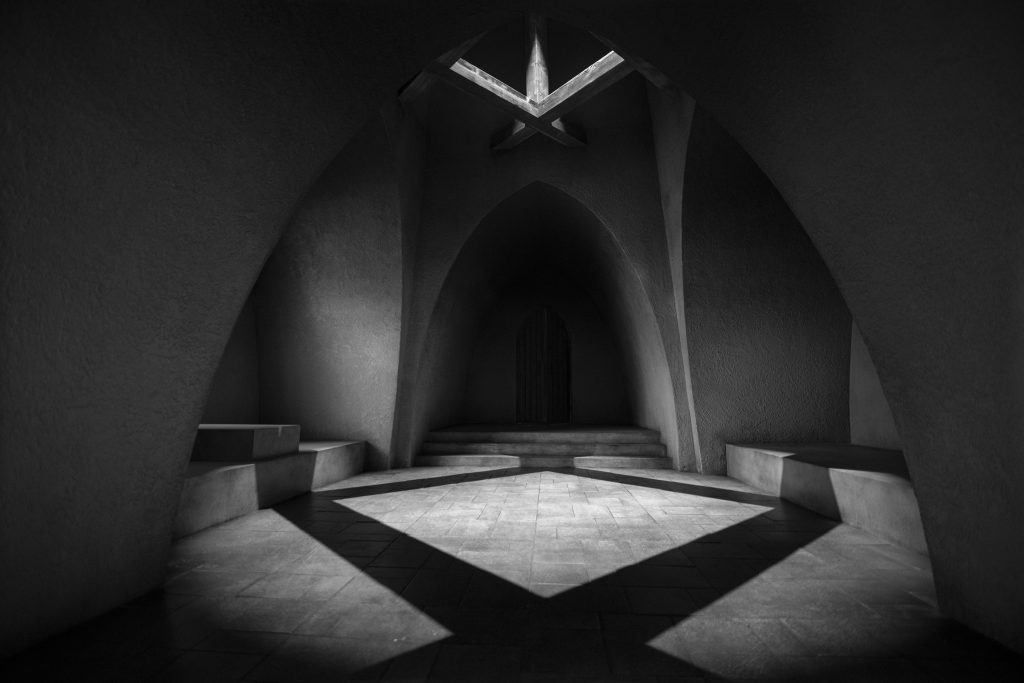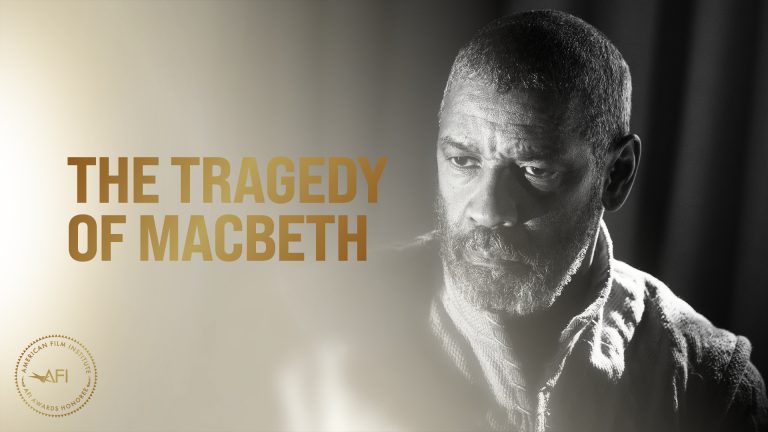Oscar Nominations:
Leading Actor (Denzel Washington)
Cinematography (Bruno Delbonnel)
Production Design (Stefan Dechant/Nancy Haigh)
The Tragedy of Macbeth, by Shakespeare, was written sometime between 1599 and 1606. The shortest of his tragedies (less than 80 pages in my version), it has been staged countless times since then. Even though it is adored by stage actors, there is a strong belief that the play is cursed and so true thespians refuse to say the name of the play in the fear of imminent bad luck, instead referring to it as “The Scottish Play”.
Moviemaking hasn’t been around since 1600, but even during its much shorter lifetime, turning Shakespearean plays into movies has been a constant endeavor. Query “Shakespeare” in IMDB and more than 1600 entries will be returned. Focus just on “Macbeth” and you still get at least a hundred entries with some versions going back to the first decade of the 1900s when movies were just beginning. Counting versions only since 2000, I uncovered more than one a year, including non-English productions and versions made for TV. Shakespeare, and Macbeth, have been done frequently and recently.
So what would be the reason to see Joel Coen’s version, the 2021 production of The Tragedy of Macbeth ? Up front I have to admit that I am nowhere near a Shakespearean scholar, but watching this film intrigued me so much that, for the first time in decades, I pulled out one of my Shakespeare volumes and read the play from beginning to end. Then I sat down with my printed version and watched the film a second time to see how well it tracked – it has been a very interesting last couple of days and made me appreciate, in ways I’ve never quite understood, how powerful Shakespeare’s language really is.
Joel Coen adapted Shakespeare’s play and directed this production. So this is his interpretation of the bard’s work. Up until this film, Joel Coen has always worked in tandem with his brother Ethan, one of them credited for writing and the other directing, and both producing, one film after another. As a team, they are noted for many wonderful, but off-the-wall productions, like The Ballad of Buster Scruggs, True Grit, Inside Llewyn Davis, No Country for Old Men, O Brother, Where Art Though, The Big Lebowski, and, one of my all-time favorites, Fargo. Their movies are often violent, but also laced with acerbic humor and with some truly wonderful roles for actors.
The Tragedy of Macbeth, though, is not like those films. This is really serious theater, with little to make you laugh. Reading my version of the play while watching the film the second time, I was amazed at how perfectly it tracked the original lines. Sometimes, especially, in the fourth and fifth acts, Coen transposes parts of one scene into another. And in a couple of cases, different actors spoke lines than in the original, but probably 98% of the movie is exactly as the dialogue is written in the play – the changes that were made seemed to accommodate the increased flexibility of a movie format over a stage version and worked well. Coen may have “written” the screenplay, but clearly the words are entirely Shakespeare’s. It is apparently a Coen brothers trait that they like to avoid improvising lines – that strategy works well with something like Shakespeare.
There are many other ways this film works so well. A key aspect is the staging. As I understand, except for the final scene in the film, everything was filmed in a sound stage, including scenes that appear, with horses and trees, to be in an outdoor setting. What this decision allows is a degree of total control over the visual environment. Taking advantage of that control, the production designer and set decorators ( Stefan Dechant/Nancy Haigh) were nominated for the Production Design Oscar The setting is both diffused and stark – the sets and staging are extremely minimalistic, not period-accurate – but more like Le Corbusier brutalism – with sheer stucco/concrete walls and empty rooms. Then there is constant use of clouds and fog to cover up everything outside of the immediate focus. The effect of this staging is to keep the viewer concentrating on the characters and, specifically, their faces and their words – which, after all, is what Shakespeare is all about.
The costumes, makeup, and music are not at all what we might typically see or hear. The clothing is rough in texture, simple in construction, and totally lacking in adornment. The makeup is minimal and, whatever there is, is used to accentuate the mouths and eyes, better to see the faces expressing their feelings. Again, the focus is shifted to what the characters are feeling and saying, not to how they look. The score, by Carter Burwell (Carol, Three Billboards Outside Ebbing, Missouri), has an eerie nature that mirrors the fog while the minimalist structure reflects the staging.
Music, costumes, make-up, staging and decorations are all possible in any theater production. But what makes this a movie is the cinematography! Bruno Delbonnel received his sixth Oscar nomination for his work here and we can assume that he, working within Coen’s vision, is responsible for some amazing decisions. The most immediately striking feature is that this is in black and white. It seems that every year there is one film done in B&W that is nominated in cinematography (last year it was Mank ) – film buffs love the old-time, noirish feel of a black and white movie. But in this case, filming in greyscales furthers the same goals as the costumes and set – this is not intended as a “visual” film, but rather one that forces the viewer to imagine the scenes based on the words. Here Delbonnel alters the color temperature to accommodate different scenes and gain a rich and robust visual feel that does not overwhelm and never leaves the grey chromatic scale. I was also intrigued by the very unusual aspect ratio (1.37:1) and the equally unusual rounding of the corners of the nearly square frame.
No matter how you film Shakespeare, it won’t work without talented actors, and Coen has assembled an amazing team. Frances McDormand plays Lady Macbeth and she is one of my favorite actresses. She won the leading actress Oscar last year for Nomadland (which I admit, I didn’t like as much as other performances), has won two other leading actress Oscars , and has been nominated three other times for supporting roles. She is one of America’s acting treasures and enlightens every movie she appears in. As the wife who steers Macbeth down his path to madness, she shows moments of sincere belief before realizing that all has been lost. Her turn of emotions is distinctly fabulous to watch. (I just have to note that being married to the director for 35 years probably helped their communication during the production – that’s not at all a bad thing). There are additional wonderful performances by Alex Hassell as Ross, Corey Hawkins as Macduff, and Brendan Gleason as Duncan. I also cannot resist a special note about the performances by Kathryn Hunter as, well, the witches. For her rare but special scenes, she steals the show and adds a new dimension to the term “body language”. “Fair is foul and foul is fair”
But none of these performances measure up to Denzel Washington’s Oscar-nominated Macbeth. Nominated for an acting Oscar nine times and winning twice (Glory and Training Day), Washington is another Hollywood legend. One of my favorite male actors, I enjoy the way he seems to feel so much at home inhabiting his characters. He is another one of those actors I would love to invite for dinner. As A.O. Scott (New York Times) said his “trajectory from weary, diffident soldier to raving, self immolating maniac is astonishing to behold…(He) summons thunderstorms of eloquence from intimate whispers.”
And what are we to take away from this terrific movie? It is, after all, a “tragedy” – it examines a man consumed by ambition and motivated by others, both real and imagined, who aggressively pursues a role far above what he might normally assume. When events, and people, appear to be in his way, he constructs elaborate conspiracy theories to explain the setbacks. He then must eliminate those in his way and, in the end…he ends. Macbeth himself, as the play is resolving, says what his life is about…”It is a tale, told by an idiot, full of sound and fury, signifying nothing.” (Read what you want into why Coen staged THIS play NOW!)
(4.5* You have to work a bit on this film – it is Shakespeare – but the payback is worth it.)
Stream on Apple TV+



3 thoughts on “The Tragedy of Macbeth”
Amazing the timing of this along with my son, Jim, seeing Coriolanus at the CU Shakespeare fest this summer, as we discussed. Enjoyed your review! Steve
Thanks, Steve. If you get a chance, watch the movie!
I was unprepared for the depth & richness of your analysis, Michael! What a gift you have.
Beautifully researched, written, & felt.
Thank you!
Sue